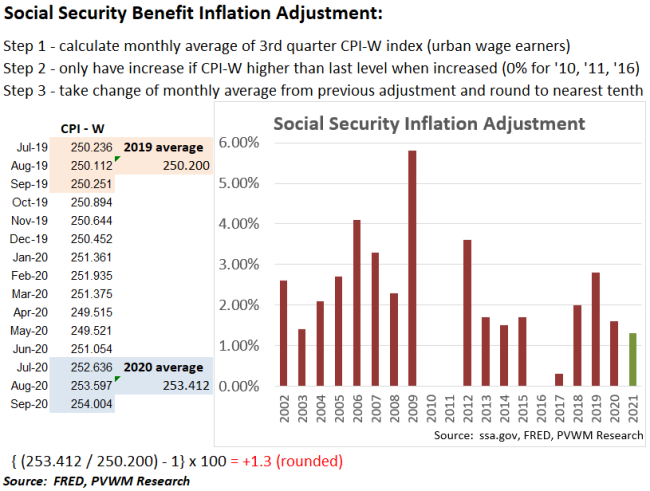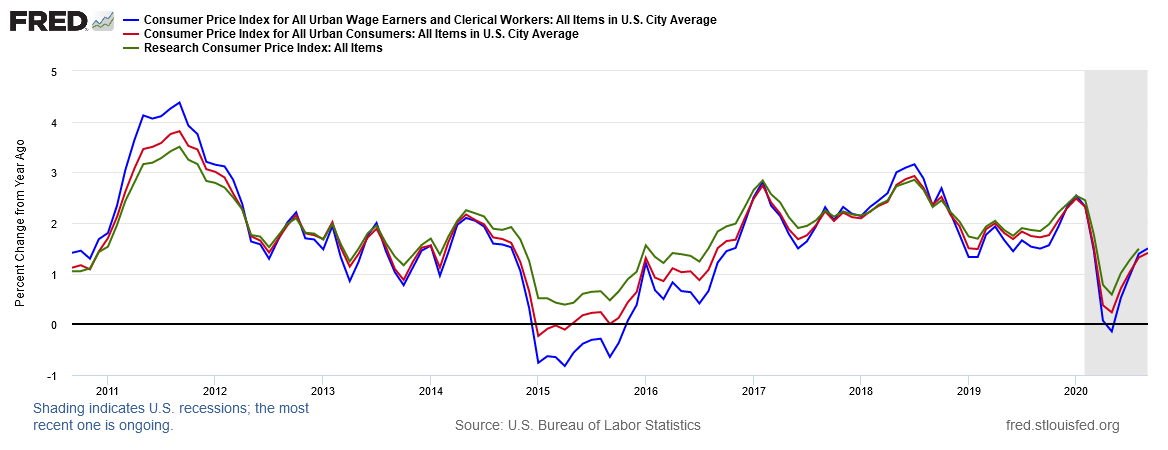
2021 Social Security Inflation Adjustment: 1.3%
Each fall after the release of September CPI data the inflation adjustment for Social Security benefits is finalized. Around that time the maximum salary subject to Social Security payroll taxes is also determined (based on a different index). The September CPI-W data point has been released and SS benefits will increase 1.3% in 2021. For those paying into SS, the maximum wage base subject to 6.2% payroll tax will go up 3.7% to $142,800.
The Medicare premiums for 2021 are typically released in early November. In April the Medicare Trustees projected an increase from the current $144.60/month up to $153.30/month. However a recent bill that passed will limit the increase to 25% of final projected amount, so expect a monthly premium in $147 area. The net SS benefit hitting your bank accounts is then the increased gross benefit less any Medicare premiums deducted and income tax withholdings.
The graphic below shows the steps to calculate the inflation adjustment and a graph of actual increases over the past 20 years.
Note the inflation index used for Social Security is the non-seasonally adjusted index for wage earners (CPI-W), not the more common seasonally adjusted index for all urban consumers (CPI-U) reported in the media. There is also a research price index called R-CPI-E which captures the common basket of goods and services for those age 62+. There are years when these indices can diverge significantly, mostly in years when headline inflation deviates from the long-run average. Last September the R-CPI-E was 0.35% higher; in August 2020 it was less than 0.10% higher (Sep reading not out yet). The graph below shows these indices over the past ten years (Note: shaded area is for recession). The common CPI inflation number in the news every month is the red line.
For those working and paying into Social Security (6.2% payroll tax for SS on wages up to $137,700 for 2020), the estimated increase in wages subject to this tax is based on a different index – the ‘national average wage index’. The maximum wage base will go up 3.7% to $142,800. Recall there is an additional 1.45% payroll tax for Medicare that is applied to all wages (not capped), plus an additional 0.9% on earnings above $200,000 for individuals and $250,000 if married filing jointly (NOT indexed to inflation). Your employer also pays these taxes (or you if self-employed), except the extra 0.90%. For those interested in a deeper dive, see my blog post on Social Security and Medicare Financial Overview.
Enjoy the inflation adjustments. That is a nice treat, not a trick.
Posted by Kirk, a fee-only financial advisor who looks at your complete financial picture through the lens of a multi-disciplined, credentialed professional. www.pvwealthmgt.com



